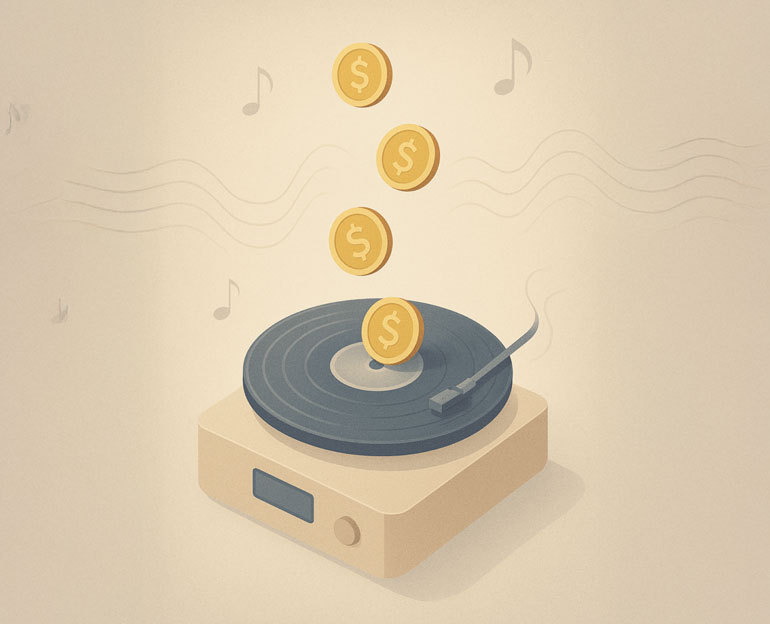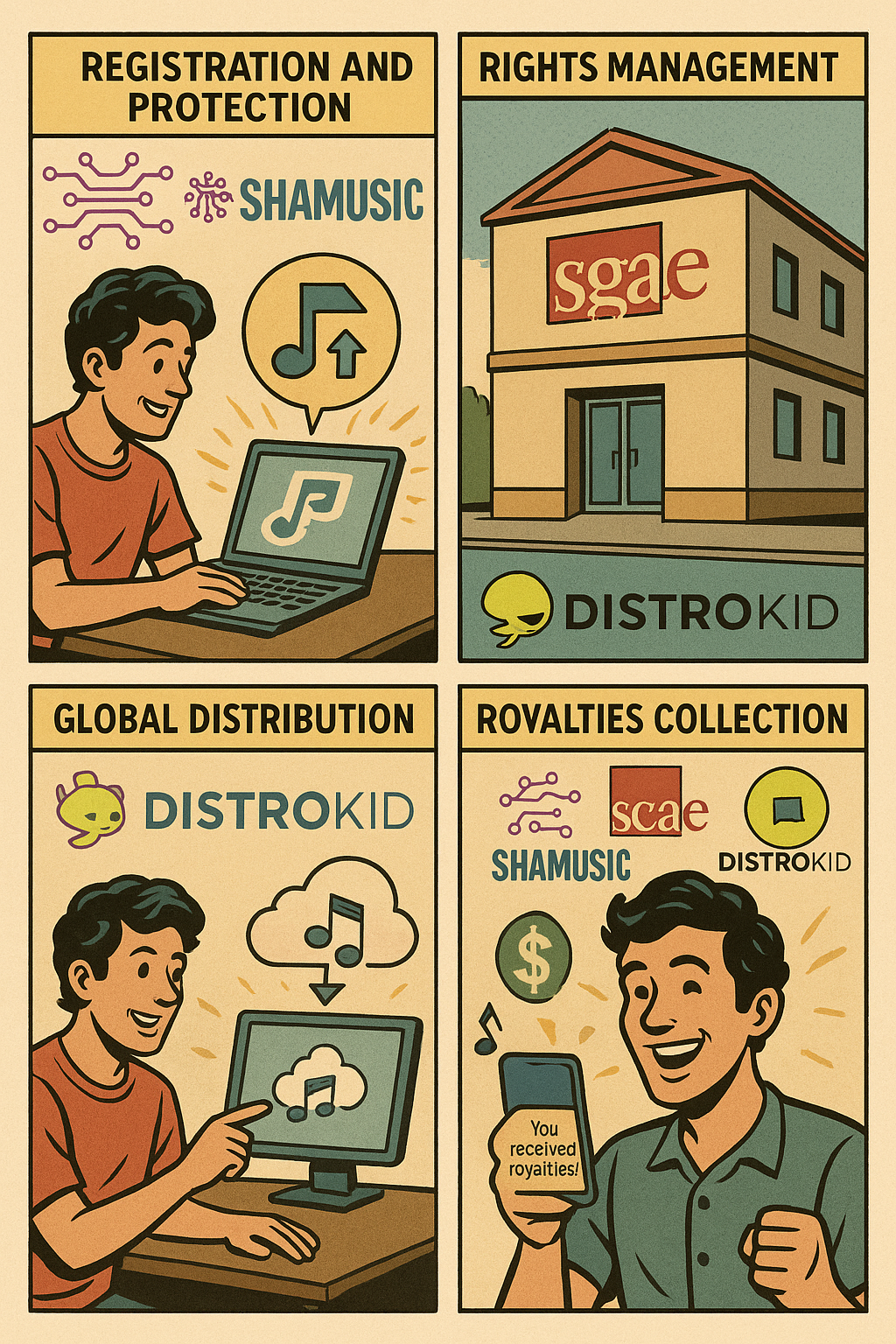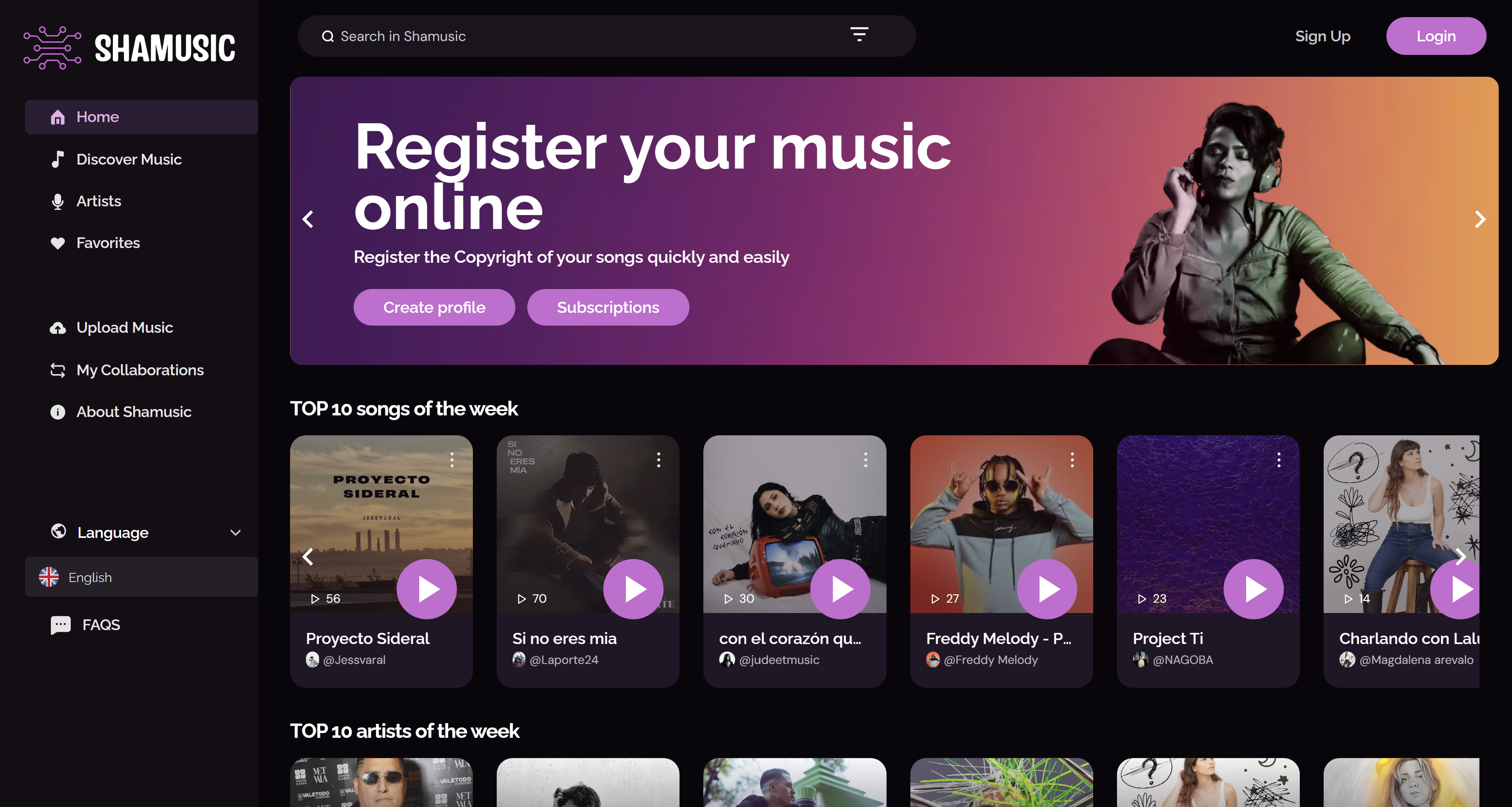
Complete Guide for Songwriters: How to Collect Music Royalties and Protect Your Music
Creating music is only half the journey; getting paid for it is another challenge many musicians face. Without clear registration and legal protection, that effort can go unrewarded. Here you’ll learn how to protect your music against plagiarism and manage music rights so that every play or performance counts in your pocket. Find out why copyright registration and membership of collecting societies like SGAE in Spain are key steps to getting what you’re entitled to.
Understanding Music Royalties

Did you know that every time your song is played on the radio, you could be earning money? Royalties are the way musicians get paid for their creative work. Let’s take a look at how this world works.
Types of Royalties
Royalties are not all the same. There are different types depending on how your music is used.
Mechanical or distribution royalties are generated when someone buys your song or listens to it streaming. Every time your track plays on Spotify or Apple Music, you earn a little.
On the other hand, public performance royalties occur when your music is played in concerts, bars or stores. If your song is played in a shopping mall, you are entitled to a share.
Synchronization royalties come into play when your music appears in movies, commercials or TV shows. Imagine your song in the next Netflix series – that generates revenue.
Importance of the Register of Rights
Registering your rights is like putting a lock on your music. Without this step, anyone could claim your song as their own.
The copyright registration of your song is your insurance. It gives you the legal power to prove that you own your work. If someone uses your music without permission, the registration backs you up to take action.
Many artists believe that it is enough to create the song to have rights. Wrong. Without formal registration, it’s your word against the word of others. The registration is your irrefutable proof of authorship.
International Music Rights Management
Your music knows no boundaries in the digital age. It can play in Tokyo while you sleep in Madrid. How do you charge for that?
The key lies in international agreements between collecting societies. SGAE in Spain has agreements with similar entities in other countries. So, if your song is played in the United States, ASCAP can collect for you and send the money to SGAE.
These agreements are complex, but crucial. Without them, you would lose money every time your music crosses borders. That’s why it’s vital to choose well who you entrust with the management of your rights.
Royalty Collection Process
Collecting royalties is not automatic. It requires action on your part. Follow these steps to ensure that every play of your music translates into revenue.
Copyright Protection with Shamusic
The first step is to shield your authorship. Shamusic offers a modern and effective solution for this.
With Shamusic, you register your song on blockchain. This creates an inviolable digital seal that proves when you created your work. It’s like a unique digital fingerprint for your music.
This record is crucial if you ever face plagiarism. You can prove that the song was yours before anyone else claimed it. In the digital world, where copying is easy, this protection is gold.
Remember: without proof of authorship, there is no basis for collecting royalties. Shamusic gives you that solid foundation right from the start.
Affiliation and Digital Distribution
Once your authorship is protected, it’s time to get your music out into the world and generate revenue.
Join a collecting society like SGAE in Spain for example. They will track the use of your music and collect on your behalf. Without this affiliation, you will lose income opportunities.
For digital distribution, use services like DistroKid or CD Baby. These place your music on streaming platforms and digital stores. The more places your music has, the more opportunities to generate royalties.
Don’t forget to register each new song with your collecting society. If you don’t, they could play without you getting a penny.
Music Collaboration Agreements
Collaborating with other artists is great for creativity, but it can be a royalty headache if you don’t handle it right.
Before going into the study, clarify the authorship percentages. Who wrote which part? How will royalties be divided? Put it in writing.
Use simple but clear contracts. Specify who is responsible for registering the song and how revenue will be reported. This will avoid future disputes that could freeze your royalties.
Remember: a poorly documented collaboration can lead to no one getting paid. Be professional from the start.
Avoiding Common Errors

Many artists lose money because of simple mistakes. Learn from them to maximize your royalty income.
Song Copyright Registration
The most common mistake is not registering your song at all. You think that just by uploading it to YouTube it is already protected. It’s not.
Formal copyright registration gives you real legal protection. In the United States, you can do it at the Copyright Office. In Spain, the Intellectual Property Registry fulfills this function and platforms like Shamusic offer this process quickly thanks to Blockchain technology.
Don’t wait until your song is a hit to register it. Do it before you release it. If someone copies it after the release but before you register it, you may have trouble claiming your rights.
Affiliation to Management Entities
Another common mistake is to rely only on streaming platforms to get paid. You forget a big part of the pie.
Collecting societies like SGAE collect royalties from sources you can’t even imagine. Radios, bars, hotels, all pay for using music.
Without membership, you lose this income. It’s like leaving money on the table. Affiliation may seem like a formality, but it’s an investment in your music career.
Co-author Recognition
Disputes between co-authors can freeze a song’s royalties. No one gets paid until the dispute is resolved.
Be clear and fair in attributing authorship. If someone contributed to the lyrics or melody, acknowledge it. It is better to give a small percentage than to risk the entire income.
Use written agreements, even with friends. Relationships change, but a clear contract protects everyone. Don’t let lack of clarity in authorship cost you money in the future.
Protecting your music and getting paid for it doesn’t have to be complicated. With the right steps, you can ensure that every note you write and every chord you play earns you the income you deserve. Remember: register, affiliate, distribute and collaborate with clarity. Your music is valuable. Make sure the world pays for it.

